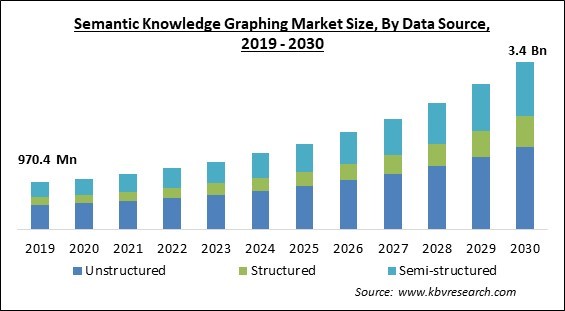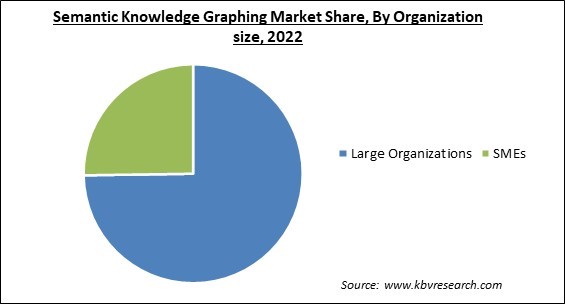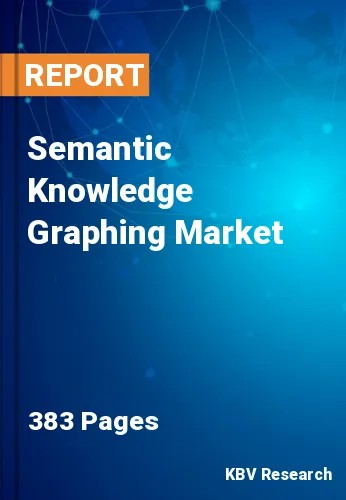The Global Semantic Knowledge Graphing Market size is expected to reach $3.4 billion by 2030, rising at a market growth of 13.7% CAGR during the forecast period.
Context-rich Knowledge Graph is anticipated to capture approximately 3/5th share of the market by 2029. Context-rich Knowledge Graph are gaining traction in Semantic Knowledge Graphing as knowledge graphs are used by contemporary data-driven businesses to address two important issues arising from the increasing decentralization of data: data access and availability. By resolving these two issues, knowledge graphs have created avenues for businesses to search their knowledge base quickly and find concealed trends in their data.
Knowledge graphs enable enterprises to skip the wide search and zero in on their desired solutions by removing a vital bottleneck of filtering through mountains of data facts and then contextualizing every relation. The volume of data is also increasing with the expansion of internet and social media platforms. In 2019, the report "The Rise of Social Media" estimated that there were 7.7 billion individuals in the world, with at least 3.5 billion of them using social media. Some of the factors impacting the market are enhanced distribution of web services, rising need for data unification, and difficulties in generalizing entities for graphing.

In the coming years, market expansion may be fueled by the proliferation of web services brought on by simple access to the internet and smartphones. Utilizing WordPress to easily create websites and having competent staff to produce a content repository might benefit the industry. The culmination of all these elements will inevitably lead to the expansion of the market in the ensuing years. A knowledge graph provides more than just the collection and storage of facts. It is a technology that offers meaningful knowledge management and can combine information from various sources, including real-world data and the context that goes with it. The market is expected to develop as more knowledge of graphs uses semantic knowledge graphing.
However, granularity is one of the main challenges in entity definition. The contrast between "Mouse Brain" and "Brain" or "Apple" and "Green Apple" is just one example of an entity that frequently lacks definite boundaries. In many contexts, both of these entities may coexist independently and vice versa. The market may suffer due to how difficult it is to generalize newly emerging things.
Based on data source, the market is classified into structured, unstructured, and semi-structured. In 2022, the unstructured segment held the highest revenue share in the market. Natural language processing (NLP) is the primary development in the unstructured segment to extract context and meaning from unstructured data sources. The major growth driver is the increasing demand for big data platforms for integrating unstructured data sources, such as text, photos, and video, to better understand consumer behavior, market trends, and various other crucial business metrics.
By graph type, the market is bifurcated into context-rich knowledge graphs, external-sensing knowledge graphs, and NLP knowledge graphs. The external-sensing knowledge graphs segment acquired a substantial revenue share in the market in 2022. In an external-sensing knowledge graph, external data sources are compiled and mapped to relevant internal entities. The impact of a natural disaster in a particular location on the supply chain can then be considered, and equivalent suppliers in other locations can be found. External insight sensing extends beyond supply chain monitoring and is used to assess compliance risk, the effect of market activity, and sales prospects.
By organization size, the market is segmented into SMEs and large organizations. In 2022, the large organizations segment led the market by generating highest revenue share. Large firms use knowledge graphs more frequently to manage their data throughout the whole enterprise. With a more comprehensive picture of the organization's data, as a result, more potent analytics and decision-making are made possible. Solutions from vendors that integrate with current data systems are being developed.

On the basis of vertical, the market is classified into BFSI, government & healthcare, IT & Telecom, retail & e-commerce, and others. In 2022, the BFSI segment held highest revenue share in the market. By analyzing client data and developing focused marketing strategies, the BFSI sector employs semantic knowledge graphing technology to personalize the customer experience. Financial companies can better cater their offerings to the demands of specific clients by using knowledge graphs to analyze customer behavior and preferences.
Based on application, the market is divided into semantic search, QnA machines, information retrieval, electronic reading, and others. The information retrieval segment recorded a remarkable revenue share in the market in 2022. There will be a greater need for information retrieval solutions to efficiently query and retrieve information from semantic knowledge graphs as more firms use them to organize and display their data. Additionally, context-aware retrieval entails figuring out the context of a user's search and customizing the results accordingly.
On the basis of task type, the market is fragmented into link prediction, entity resolution, and link-based clustering. The link-based clustering segment recorded a remarkable revenue share in the market in 2022. A semantic knowledge graph's nodes are grouped using a process known as link-based clustering. Link-based clustering can be used with other technologies, like image and natural language processing, to build more complex knowledge graphs. For instance, visual patterns and correlations could be found using a knowledge graph that combines text and image data.
| Report Attribute | Details |
|---|---|
| Market size value in 2022 | USD 1.2 Billion |
| Market size forecast in 2030 | USD 3.4 Billion |
| Base Year | 2022 |
| Historical Period | 2019 to 2021 |
| Forecast Period | 2023 to 2030 |
| Revenue Growth Rate | CAGR of 13.7% from 2023 to 2030 |
| Number of Pages | 383 |
| Number of Table | 650 |
| Report coverage | Market Trends, Revenue Estimation and Forecast, Segmentation Analysis, Regional and Country Breakdown, Companies Strategic Developments, Company Profiling |
| Segments covered | Organization size, Task Type, Data Source, Graph Type, Application, Vertical, Region |
| Country scope | US, Canada, Mexico, Germany, UK, France, Russia, Spain, Italy, China, Japan, India, South Korea, Singapore, Malaysia, Brazil, Argentina, UAE, Saudi Arabia, South Africa, Nigeria |
| Growth Drivers |
|
| Restraints |
|
Region wise, the market is analysed across North America, Europe, Asia Pacific, and LAMEA. In 2022, North America region led the market by generating the largest revenue share. The substantial investment in semantic knowledge graphs, notably in the healthcare & life sciences industries, has made North America the most significant market. Semantic knowledge graphs had their biggest regional market in the United States, and many businesses were investing in creating solutions to enhance data analytics and interoperability.
Free Valuable Insights: Global Semantic Knowledge Graphing Market size to reach USD 3.4 Billion by 2030
The market research report covers the analysis of key stake holders of the market. Key companies profiled in the report include Amazon.com Inc., Baidu, Inc., Meta Platforms, Inc. (Facebook), Google LLC (Alphabet Inc.), Microsoft Corporation, Mitsubishi Electric Corporation, Wipro Limited, Yandex N.V., Stardog Union and Vaticle Ltd.
By Organization Size
By Application
By Vertical
By Task Type
By Data Source
By Graph Type
By Geography
The Market size is projected to reach USD 3.4 billion by 2030.
Enhanced distribution of web services are driving the Market in coming years, however, Difficulties in generalizing entities for graphing restraints the growth of the Market.
Amazon.com Inc., Baidu, Inc., Meta Platforms, Inc. (Facebook), Google LLC (Alphabet Inc.), Microsoft Corporation, Mitsubishi Electric Corporation, Wipro Limited, Yandex N.V., Stardog Union and Vaticle Ltd.
The Semantic Search segment acquired maximum revenue share in the Global Semantic Knowledge Graphing Market by Application in 2022 thereby, achieving a market value of $1 billion by 2030.
The Link Prediction segment is leading the Global Semantic Knowledge Graphing Market by Task Type in 2022 thereby, achieving a market value of $1.4 billion by 2030.
The North America market dominated the Global Semantic Knowledge Graphing Market by Region in 2022, and would continue to be a dominant market till 2030; thereby, achieving a market value of $1.1 billion by 2030.
Our team of dedicated experts can provide you with attractive expansion opportunities for your business.

